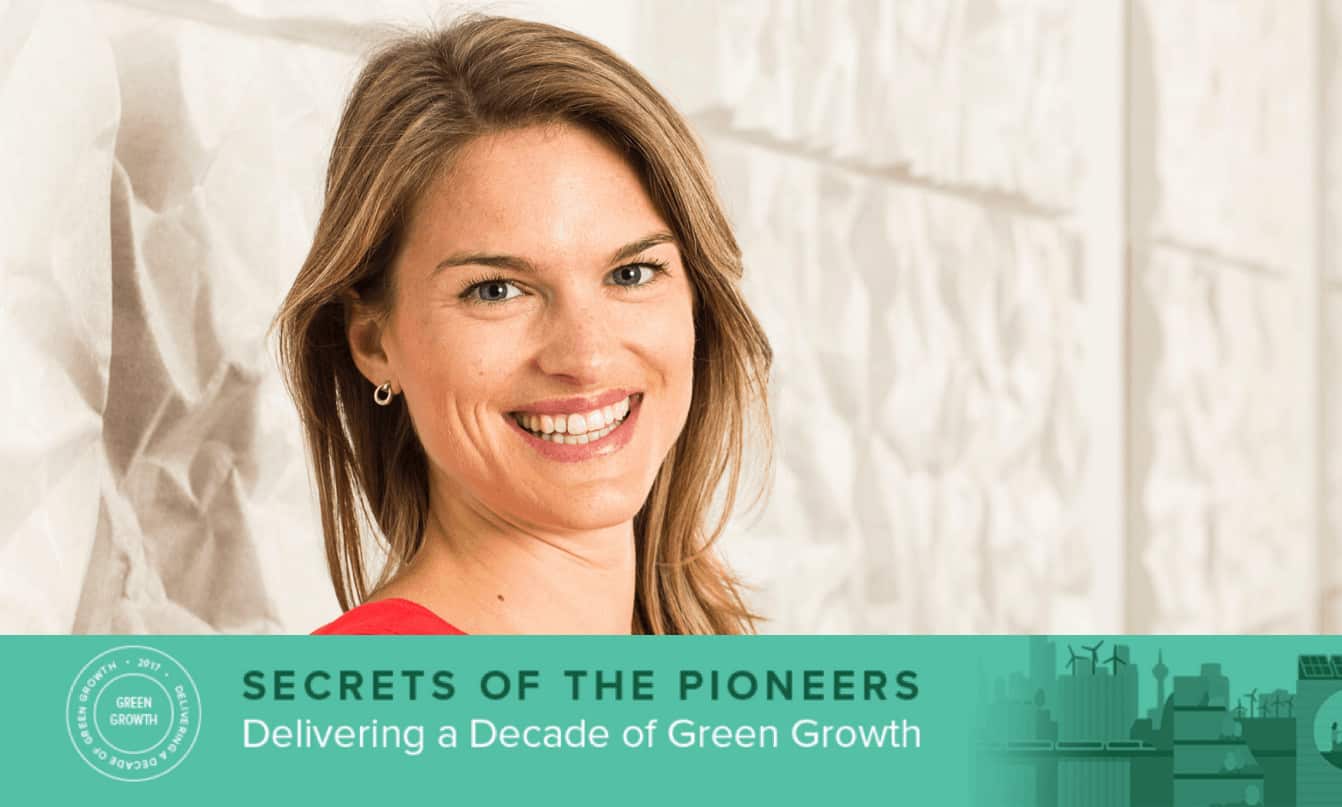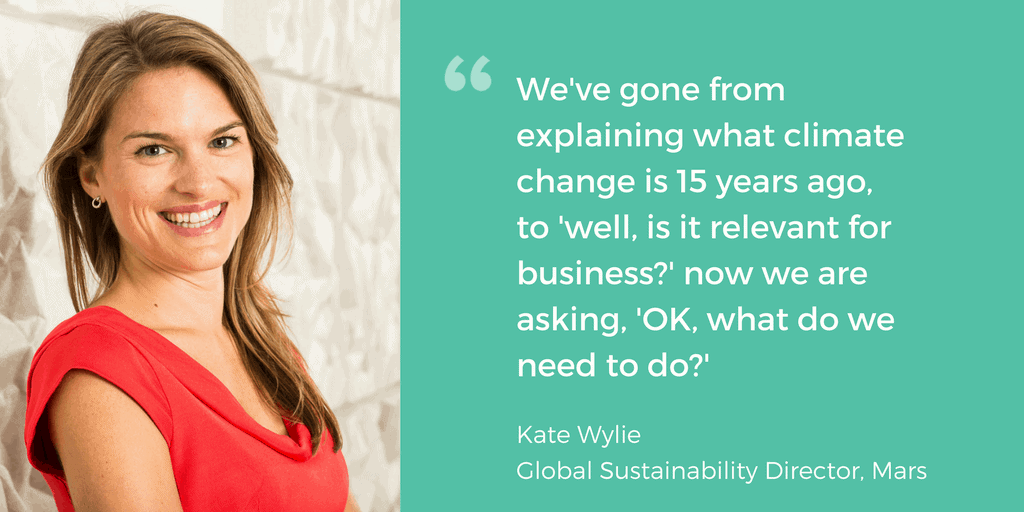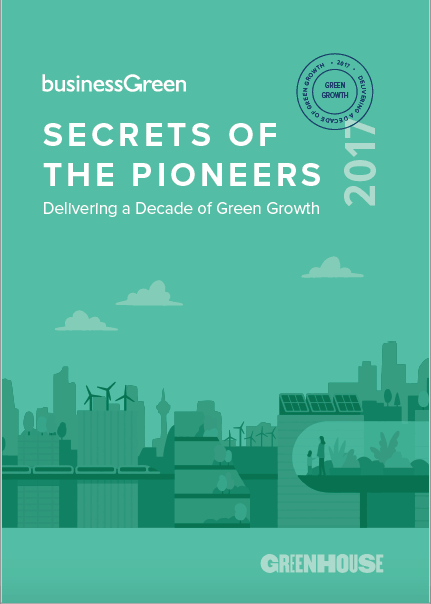Secrets of the Pioneers: Kate Wylie

We talk to Kate Wylie, global sustainability director at Mars. With 15 years’ experience in corporate sustainability under her belt, Wylie has helped shape environmental strategy for the likes of eBay, Barclays, and Etsy.
The interview is part of a series for a report, Secrets of Pioneers, Delivering a Decade of Green Growth, which will be launched at the BusinessGreen Leaders’ Summit on 9th November 2017.
Where were you in 2007?
I was at Ebay working on the sustainability strategy there. The world then was still exploring what sustainability was. You had to do a lot more explaining of the fundamentals.
Whereas now everybody understands climate change, understands water scarcity, at a high level at least, and there’s much more focus on the ‘how’, rather than the ‘what’.
Over the last 10 years, what is the most important lesson you have learned?
How to drive change within a business. One of the most important lessons I have learnt is to put myself in the shoes of the people I am working with. You need to understand where someone is coming from. Put yourself in their shoes and understand their needs, and then work together on how you can deliver change.
Where do you expect to be in 2027?
I would love to still be working in this area, to look back on the last 10 years and be very proud of the delivery both that I have helped lead and seen others lead.
What is your vision for the green economy in 10 years’ time?
First of all, let’s all just sign up to the ‘what’. Let’s assume we all agree on climate science, then let’s sign companies up to SBTs, or Science-Based Targets, and then let’s try and drive leadership on the ‘how’.
We are going to enter some really interesting forms of collaboration in order to get there, particularly when you start looking at issues like water.
What will be the biggest changes from today’s world?
I think what we will start to see more and more is that sustainability will either become standard operating procedures, or a standard part of products and services – so consumers might not even know about it. Or it will become standard in a way that they do know about it and they can just talk about it naturally.
What top three sustainability challenges do you think will be top of the agenda in 2027?
I think today the challenge is still getting people aligned on the SBTs, but in the future everybody will have signed up, everybody will be driving that charge, and we will be getting much more technical. For example, when you are working at the watershed level, when you have farmers who are both upstream and downstream, how does that work when you’re trying to address water challenges?
Secondly, we will need a much more open and honest dialogue about what is working and what is not working. That’s a challenge. Companies are very used to talking about the good things! I think that’s something Mars hopefully has created a safe space for – to start discussing some of the complexity and how we can have an open and honest dialogue together to solve those problems.
Thirdly, there will be a lot more evidence on the win-win for business. That again will be standard practice, and it will be more about the laggards behind helping catch up on that.
Will the world be on course for two degrees?
I’m very positive about this. Particularly with the energy that we saw from Climate Week NYC.
The number of companies on track to do this, some of the innovation that is starting to happen now in technology, the leadership we are seeing, and the fact the business case is there. That all gives cause for optimism.
If you could invest in one clean technology through to 2027 which would it be and why?
I would go for renewables in emerging markets. Because I think there is such growth potential there when you look at how it’s developed in other countries. My husband also works in it too, which helps!
What advice would you give to a sustainability professional starting their job today?
This area is going to get much more technical. We have been on a journey over the last few years. Fifteen years ago, I was explaining to people what a carbon offset was and what climate change was. Then you went into ‘well, is it relevant for business?’ Now we are into, ‘OK, what do we need to do?’
I think the next stage is the ‘how’, and the technical side of things. For people starting out now, I would always recommend they bring in one area of technical expertise as a foundation that you can build on
This interview is one of a series which make up a report, Secrets of the Pioneers: Delivering a Decade of Green Growth, to be published on 9th November, coinciding with the .
We will continue to preview interviews on the Greenhouse PR blog this week. Earlier this week we featured Juliet Davenport, founder of Good Energy, Mark Campanale, founder of Carbon Tracker, Josh Hardie, deputy director-general for policy and campaigns at the CBI and Lord Adair Turner [LINK], chair of the Energy Transitions Commission. The five interviews published last week are also still available on the blog.
This year marks the 10th anniversary of both BusinessGreen and Greenhouse PR, the specialist communications agency which supports businesses, entrepreneurs and campaigners working to create a green economy.
At Greenhouse, we support a wide variety of organisations pioneering new standards of sustainability across multiple sectors. Whether it’s fashion, finance or farming, we’re always on the look-out for new opportunities to reach our clients’ target audiences. If you’ve got a great story and need our help to tell it, we’d love to hear from you.




